The 10,500 athletes participating in the London Olympic and Paralympic Games, the world's greatest celebration of human physical endeavour and progress, will be guarded by a security force of some 40,000. This beats the 3:1 ratio of guards to athletes at the 2010 Vancouver Winter Olympics, as the London Games continues the Olympian trend for record-breaking security contingencies. Indeed the home secretary, Theresa May, only last month crowed that the Games' security would constitute "the UK's largest ever peacetime logistical operation". Never mind the performance of athletes: the Olympics is about government and business delivering security solutions.
And it's a great show. Armed officers from the Metropolitan police and the Royal Marines hammering along the Thames in speedboats and helicopters, ground-to-air missiles scanning the skies, hovering spy drones scanning the land, security services scanning the internet for nascent plots or cyber attacks – it's all being co-ordinated by a bevy of Olympic-themed security agencies.
The police-led multi-agency National Olympic Coordination Centre co-ordinates the forces to deal with the threats identified in the Olympic Intelligence Centre's "national Olympic threat assessments, while the Olympic Clearing House is screening 380,000 people, from athletes to voluntary litter pickers, seeking accreditation for the Games. Meanwhile the UK Borders Agency boasts the UK is to be the first country to welcome arriving athletes by funnelling them up dedicated "Olympic lanes" at airports for fast-track fingerprinting.
Locals are also in the firing line, in subtle, privatised ways. Houseboaters on the River Lea have been priced out of a controlled mooring zone around the Games, while the £60m Prevent strategy has screened the five Olympic host boroughs for what threat they pose for brewing local extremism, with "engagement officers" dispatched to each borough.
Random security screening has been carried out on cars parked at Stratford City's Westfield shopping centre, by officers from the staggering 23,700-strong private security contingent of the London Organising Committee of the Olympic and Paralympic Games (LOCOG) and G4S. Westfield isn't even in the Olympic park, itself a hotbed of embedded biometric scanners and CCTV with automatic facial and behaviour recognition technologies, amid which LOCOG's forces can search anyone and use "all available powers" to dispose of troublemakers, particularly anyone caught with anything that could be used … in a tent.
Who LOCOG's bouncers are accountable to is not clear, but they are backed by 13,500 military reservists, apart from countless police deployments, and international contingents such as up to 1,000 US agents, possibly armed. The Games' security costs exploded from £282m in 2010 to £553m by end-of 2011, with another £475m for policing. Under the host city contract, the chancellor of the exchequer signed a guarantee "bearing the costs of providing security" – a blank cheque signed by the taxpayer for Olympic security planning that industry lobby body the British Security Industry Association (BSIA) has proudly been involved with from the outset.
Olympic security is booming business. The $1.7bn security budget for the 2004 Athens Games was over four times that of the 2000 Sydney Games, while $6.5bn went on security at the 2008 Beijing Games, mostly going on security technologies supplied by firms like General Electric and Panasonic – two major sponsors of the London Games. Beijing also saw innovations like armed police zipping around on Segways, or tickets inserted with radio-frequency ID chips to enable the real-time tracking of ticket holders.
Bureaucrats and lawmakers have internationalised efforts to use the Olympics to install and expand intrusive, permanent surveillance measures. The 2005 European Prüm Treaty justified the mass sharing of data among Europe's security forces on convicted criminals, suspects, possible protesters and anyone deemed suspicious for seeking to attend a big sporting event. Britain didn't sign Prüm but certainly shaped and aped its aims, as it did from a 2006 EU manual that standardised how the security forces should respond to threats arising from major events, "political, sporting, social, cultural or other".
Amid the greater alarm of security and the Games, the coalition is soon to wheel out the Communications Capabilities Development Programme – an old, dusted-down plan to force companies to hoard of all text, phone call, email and internet data.
Meanwhile, installed gadgetry always finds other uses. CCTV set up to monitor traffic during the Athens Games were later used to monitor public gatherings. In addition, a communications system set up to co-ordinate the Greek emergency services has, at great cost, been expanded into a surveillance command system dealing with "Greek post-Olympic security needs", presumably in great use now in the bankrupt land where the Games were born.
And so thousands of impoverished teenage Londoners who've lost playing fields to highly secured Olympic carparks, missed out on sports training or couldn't afford tickets, instead of rioting, may take up X-ray screening and door supervision qualifications backed by LOCOG, the BSIA and Home Office, securing their own futures by becoming part of the industry that's securing all our futures. Everyone's a winner.





